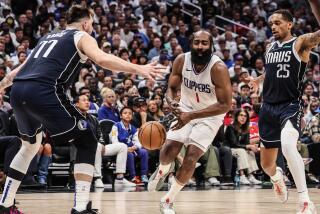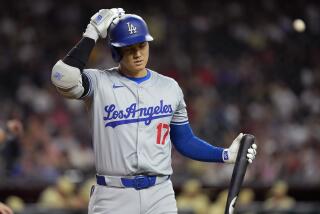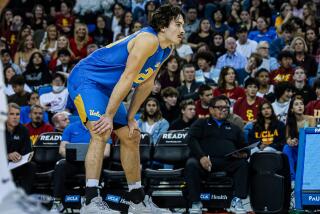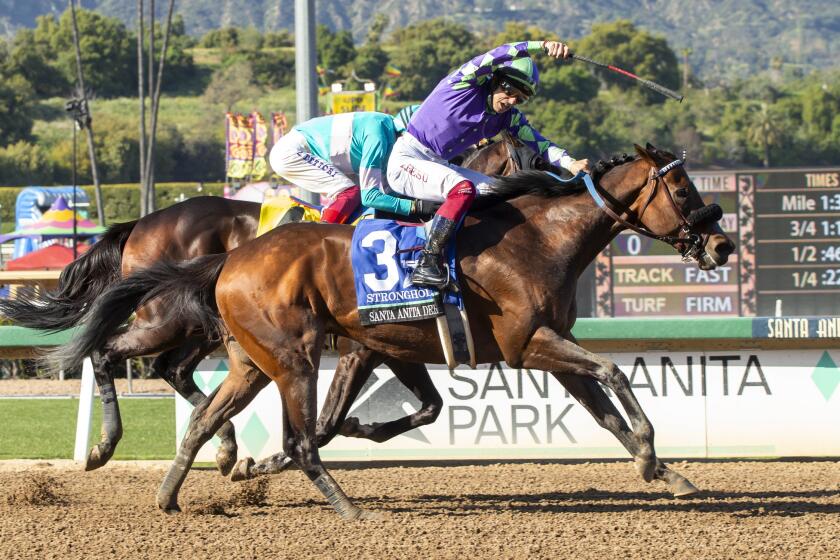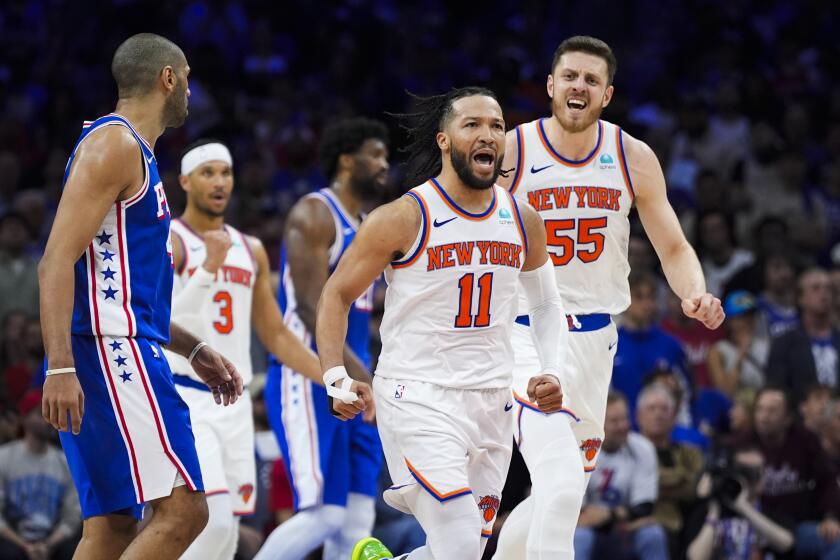Garrido a Titan in CS Fullerton’s Sports Pantheon : Baseball: His 20-year tenure has produced two national titles, and current team is ranked No. 1.
Augie Garrido is in one of his favorite haunts, behind a batting cage working with one of his players at a midweek practice.
D.C. Olsen is on one knee, his right leg stretched stiffly to his side. It seems a strange pose for a first baseman who is 6 feet and 215 pounds.
A teammate tosses baseballs softly from a few feet away, and Olsen swings, first with his left arm, then his right, and finally with both hands gripping the bat.
Garrido offers a suggestion here, some praise there, reinforcing and reminding. The drill is one of many that are fundamental to Garrido’s approach to coaching baseball at Cal State Fullerton.
“This is really what I like the most, helping the players develop,” Garrido says.
His methods, formed by what Garrido calls his “teacher’s mentality,” have produced extraordinary results at a university not accustomed to athletic excellence.
In two stays at Fullerton, Garrido has won two national, six NCAA regional and 15 conference championships. This season, his 20th at Fullerton, the Titans are ranked No. 1 in the nation with a 51-9 record and are trying to earn Garrido his seventh trip to the College World Series.
“There’s a hidden part of Augie that not many people know much about . . . how much he demands of himself as a teacher of the game,” said Florida State Coach Mike Martin, a longtime friend and rival. “He’s genuinely concerned about bringing everything out of a person he can.”
Few college baseball coaches have been more successful. Garrido’s teams at Fullerton, San Francisco State, Cal Poly San Luis Obispo and Illinois have won 1,099 games. Only 11 NCAA Division I coaches, six active, have won more than 1,000.
“I remember when I first met him at the National Baseball Congress tournament in Wichita [Kan.] in 1977,” Martin said. “There was a player on the team that left, went home. Augie shouldered all the blame himself and said he felt responsible because he didn’t make him a much better player than he was. It made such an impression on me.”
Garrido, 56, is not the rambunctious coach who arrived at Fullerton in 1973. And he’s not as brash as when he stepped in front of the microphones after his team lost its first game in the 1979 College World Series and predicted it still would win the championship. After all, it was double-elimination, right? A week later, the Titans did as Garrido predicted.
*
“He was more emotional in those earlier days,” said George Horton, who played for Garrido in 1975 and 1976 and has been his associate head coach the past five years. “It probably was a more win-at-all-costs philosophy then. My way or the highway, you know? I think he’s changed as the players have changed.”
Garrido’s face is more lined now, his hair gray. His disposition has become more mellow, more composed.
Garrido says he has matured.
“ Defiant , that’s probably a good word to describe the way I used to be,” he said, smiling. “My father always used to laugh and say, ‘Augie, you could never have played for you.’ ”
Garrido grew up in the housing projects of Vallejo in Northern California. His father, a fast-pitch softball catcher, worked at Mare Island shipyard during the day and the neighborhood recreation center at night. Garrido went to the center with him and became involved in sports.
Garrido defied his father by refusing to work at the shipyard after graduating from high school.
“I remember at that time seeing a guy on ‘The Ed Sullivan Show’ who was really good with a yo-yo,” Garrido said. “I decided that if you’re really good at anything, even doing the yo-yo, you can make a living out of it, so I told my dad, ‘I’m going to college.’ I told him the one thing I knew was sports and I’d gotten a lot of that from him. I wanted to be a coach.”
Garrido went to Fresno State, lived in a migrant worker shack in an almond orchard and played baseball. He spent six years in the Cleveland Indians’ minor league system as an infielder, then started coaching at Sierra High in Tollhouse, Calif.
After three years there, a year at San Francisco State and three at Cal Poly San Luis Obispo, Garrido arrived at Fullerton. Neale Stoner, basketball coach at San Luis Obispo when Garrido was there, had become Fullerton’s athletic director; he hired Garrido less than a year later.
“I probably wouldn’t have moved at that point if it weren’t for Neale and the president at the time, Don Shields,” Garrido said. “I felt real good about their commitment to the program.”
In the eight years before Garrido arrived, Fullerton had won 35% of its baseball games. That changed quickly. The Titans, then a Division II baseball program, won the conference championship in Garrido’s second year. Soon after, Stoner told Garrido he had good news and bad news.
*
“He said the good news is that we’re increasing your budget by $4,500,” Garrido said. “But the bad news, he said, is that we’re going to Division I with that budget, which still was only about $6,000.”
Garrido learned to make the most of less, even if the move to the NCAA’s highest division put the Titans against tougher competition. In 1975, the Titans won the Pacific Coast Conference championship and advanced to their first NCAA Division I regional. It was a quick move up in class: The regional was at USC, which had been dominating college baseball under Rod Dedeaux.
“I remember at the coaches’ get-together the night before, the organist came up to me and asked if she could have a copy of the music for our fight song,” Garrido said. “I remember saying, ‘I don’t think we have a fight song. I’m not sure we even have a band. But the players kind of like a song by the Doobie Brothers.’ ”
Instead, Garrido recalls, the organist played “It’s a Small World” when the Titans were introduced, and some rival fans jeered the team as “Cal State Disneyland.”
But upstart Fullerton stunned USC in the opener and went on to win the championship from Pepperdine on a home run by Horton.
“I really think the spirit for our program was set by that, even though we were eliminated quickly in the College World Series that year,” Garrido said. “But just being in Omaha [Neb., the series site] was a big thing.”
Garrido says Fullerton’s location was a vital factor in its success.
“I knew if we were going to continue to be successful, we had to get the good players here,” he said. “We didn’t have the money to go all over recruiting them, but if we were in the oil industry, we were sitting in the middle of the oil. The area was the best resource we had.”
In 1975, several players from Cerritos College became the building blocks, among them pitcher Dan Boone, who won 24 games in two seasons and was the first Titan player to reach the major leagues, with the Angels.
All 34 players on this season’s roster are from California, all but 12 from Southern California. Eight are from Orange County.
Garrido says the first national title in 1979 was another big leap forward. After the opening-game loss, the Titans battled through the consolation bracket and defeated Arkansas, 2-1, in the title game, fulfilling Garrido’s prediction.
Fullerton won another regional in 1982 and the College World Series again in 1984. That championship is memorable to Garrido because he believed the players overachieved.
“That team gave me a clear definition of what the word champion really means,” he said. “It was a team that really rose to the occasion and was successful against all the odds.”
*
Stoner became athletic director at Illinois and lured Garrido there after the 1987 season with an offer of money and a pledge to build a successful baseball program in a conference where football and basketball were royalty. At the time, Garrido was having concerns about Fullerton’s commitment to baseball.
At a school that hadn’t won a Big Ten baseball championship in 26 years, Garrido won two in three years. But then Stoner resigned under fire and was replaced as athletic director by football Coach John Mackovic. Baseball again became less of a priority.
The decision by Larry Cochell, Garrido’s successor at Fullerton, to leave for Oklahoma couldn’t have come at a better time for Garrido, who saw new hope when the university committed to building a new baseball field. Fullerton had to play two more seasons at antiquated Amerige Park during construction, but it was as though Garrido had never been away.
The 1991 team won the conference title, and by 1992, the Titans were again in the College World Series, in which they lost the championship game to Pepperdine.
A year ago, the Titans won another regional championship, at Stillwater, Okla., with a dramatic, extra-inning victory over Oklahoma State. The Titans advanced to Omaha and reached the semifinals before losing to Georgia Tech.
But things still are not the way Garrido would like them to be.
Fullerton’s stadium is incomplete because of a lack of funding. Among other things, there are no permanent restrooms, no team meeting room, no offices for the coaches.
Garrido said the improvements haven’t come as fast as he hoped when he returned, but he remains optimistic that they will.
Because Fullerton’s stadium has never been up to the standards of a regional tournament site, the Titans must fight for World Series berths on the road. They are in Baton Rouge, La., in a regional that includes powerful host school Louisiana State.
The Titans edged unranked Northeast Louisiana, 7-6, in their opener Thursday and drubbed James Madison, 9-1, on Friday.
Somehow Garrido has turned a disadvantage into an advantage by building a road-warrior mentality among his players.
“Nobody prepares a team to play on the road better than Augie does,” Martin said. “That’s got to be motivation. And he’s probably the most difficult coach to prepare for . . . you never know what his teams are going to do.”
Twenty-one Fullerton players have played in the major leagues; six have been first-round picks. Phil Nevin, 1992 national player of the year, was the first selection in the 1992 amateur draft and appears on the verge of reaching the majors with the Houston Astros. Tim Wallach of the Dodgers also was chosen college baseball player of the year, in 1979. And four of Garrido’s assistants have gone on to Division I head coaching jobs.
After more than 40 years playing or coaching baseball, Garrido says what he respects most is the difficulty of playing it well.
He was in a whimsical mood not long ago, and he thought about that and said, “Did you see the movie ‘Backdraft?’ Remember when the character Donald Sutherland played was trying to get to the essence of fire, and he very mysteriously said, ‘But have you seen the animal?’ And he got this sort of glow about him, like you knew he felt he had.
“Baseball is a lot like that. You know, ‘Have you seen the animal?’ Some people see it, and some people don’t.”
Garrido laughed, and there was a sort of glow about him.
More to Read
Get our high school sports newsletter
Prep Rally is devoted to the SoCal high school sports experience, bringing you scores, stories and a behind-the-scenes look at what makes prep sports so popular.
You may occasionally receive promotional content from the Los Angeles Times.
